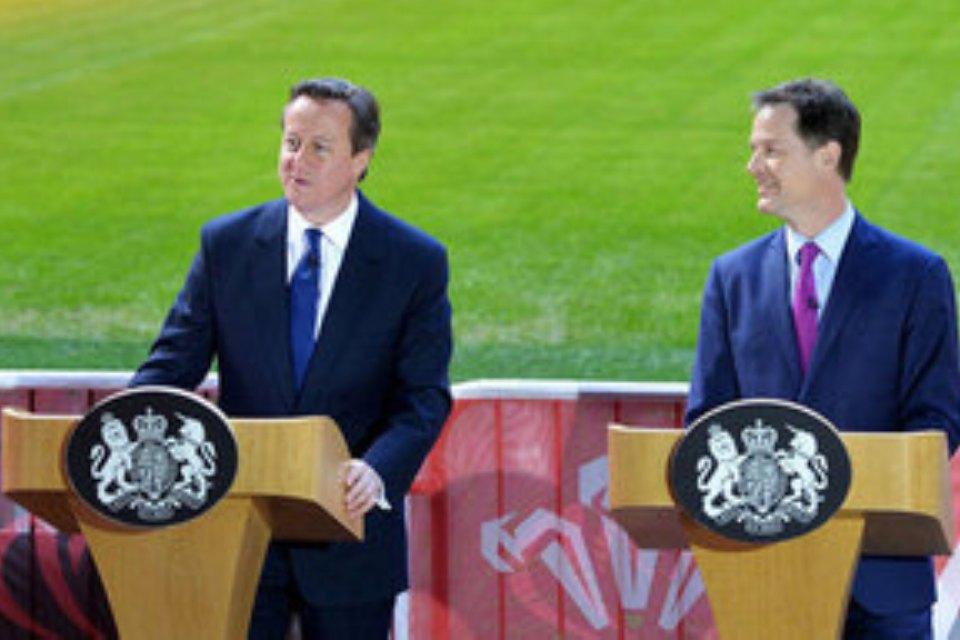Welsh devolution - St David’s Day Agreement: Prime Minister's speech
David Cameron today announced a new model of devolution for Wales, new powers to the Welsh Assembly and protection of the level of funding for Wales.

Introduction
It’s great to be here at the Millennium Stadium today. From the Six Nations and the Rugby World Cup, to Paul McCartney and Rihanna, this stadium is one of the greatest arenas on the planet. It’s a source of huge pride here in Wales and a source of huge pride for our whole United Kingdom. And that makes it a fitting place to come to talk about the future of Wales as part of the United Kingdom.
Now, 3 politicians lining up in the tunnel to announce an historic agreement. It might not be quite up there with Sam Warburton leading the Welsh out to a Grand Slam, injuring his shoulder, and lifting the trophy with one hand. But the St David’s Day agreement we have reached today does represent one of the biggest transfers of power in the history of Welsh devolution.
Read the command paper: Powers for a purpose: Towards a lasting devolution settlement for Wales.
It is the culmination of a cross-party process led by Stephen Crabb to build consensus. And as he said, after that Scottish referendum, I said that I wanted Wales to be at the heart of the debate about further devolution and today we are showing that it is.
At the heart of the package we are announcing today are 3 vital new elements.
- A completely new model of devolution in Wales, so more clarity.
- The transfer of significant new powers for Wales, so more power.
- A funding proposal for Wales that paves the way for a landmark referendum on tax-raising powers, so more fairness.
Let me say a word about each – clearer; stronger; fairer.
New model of devolution
First, a new model of devolution.
In Scotland – where there is a so-called Reserved Powers model. The default position is that everything is devolved except those things that are reserved by Westminster.
But in Wales it has been the reverse. Nothing has been devolved except those specific things which Westminster legislates to let go of.
Now, today’s agreement will change this.
Introducing the Reserved Powers model to Wales will mean much greater clarity about the responsibilities of each Parliament and each government respectively, bringing more transparency to the operations of government.
New powers
Second, in changing the model of devolution, today’s agreement also devolves wide-ranging new powers to the Welsh Assembly.
So whether it’s licences for unconventional gas, decisions over ports, taxis and bus regulation, setting speed limits, energy projects, reducing the voting age to 16 for Welsh Assembly elections or deciding the electoral system, the number of constituencies, boundaries, timing and conduct of Welsh Assembly elections, all these decisions will be taken here in Cardiff by the Welsh Assembly.
Funding floor and referendum
Third, we’re proposing what’s called a “funding floor” – to protect the relative level of funding for Wales and this will provide certainty for the Welsh government to plan for the future and grow the economy.
We have a good track record as a UK government both of investing in Wales and delivering to Wales significant tax powers. These are the tools for helping to grow the economy – creating jobs and prosperity for people in Wales.
A funding floor removes the last remaining barrier to a referendum on income tax devolution and it means people can go into that referendum knowing there is a funding guarantee for Wales.
So today’s agreement paves the way for a referendum that could deliver an Assembly that’s not just a spending body but is actually responsible for raising more of its revenue too.
To me that is responsible devolution; that is real devolution and I think that is vital for Wales and for the UK.
Conclusion
This is about finding lasting settlements across the country to make our United Kingdom stronger and fairer.
And I’m very grateful to the Welsh Secretary Stephen Crabb and his ministerial team, my coalition partners, including the Deputy Prime Minister and Danny Alexander, Paul Silk and the Commission and all those who have worked to make this settlement possible.
It means more responsibility for the Welsh Assembly. It means more decisions taken here in Wales and more opportunity for the Welsh people to hold their politicians to account. And it also means those who spend taxpayers’ money must also be more responsible for raising it.
The priority for most people is about the quality of their life, their jobs, the future for their family. So I hope the next great debate is not about which powers should rest where, but instead about how these powers are used for the people of Wales. How both of Wales’ governments can do all they can within their powers to make Wales prosper for decades to come.
This is devolution with a purpose.
An enduring settlement for Wales which works for Wales today, tomorrow and for generations to come.